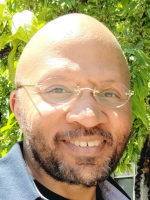
By Sean Patton
Band and Orchestra Director at the Duke Ellington Conservatory of Music and Art in Detroit, Michigan, and Member of Grace Community Church
As a Christian who is Black and American, I look back on my personal heritage, at my ancestors who hoped and trusted in Christ. As a father, I seek to encourage my children to look to God as their hope and salvation. As a music teacher, I use music as a focal point during Black History Month to help students understand and appreciate its meaning and relevance. My students learn about famous Black musicians and their contributions to our history through music. I encourage my students to see the healing and encouraging power of music because music is – and has been – an essential element in the narrative and culture of Black Americans. In times of struggle and triumph, much of what comforts, encourages, and edifies is housed in music created by Black people and informed by their lived experiences in America. From spirituals to the blues, from “Swing Low, Sweet Chariot” to “Swing Low, Sweet Cadillac,” music has always been at the center, providing hope, providing encouragement, and helping to tell the story of how an oppressed people overcame through perseverance and, very often, trust in God. Music offers a way to understand how God has been a very needed refuge and strength for many Black Americans over the years.
In James Weldon Johnson’s poem “Lift Every Voice and Sing,” we are invited not only to lift our voices, but also to sing, informed by faith in God. The line “Sing a song full of the faith that the dark past has taught us / sing a song full of the hope that the present has brought us,” calls to mind Paul’s words to the Romans: “For whatever was written in former days was written for our instruction, that through endurance and through the encouragement of the Scriptures we might have hope” (Romans 15:4 ESV). The stories written in Scripture teach how God’s people in the past hoped in God and overcame. They provide encouragement and comfort; they give hope. In the same way, I also learn from the stories of my ancestors past – oftentimes the “dark past” – and how they hoped and believed in God for a change to come. So when I look at the present and all the goodness that has come despite our “dark past,” I am full of hope, and I thank God.
The Scriptures were the backdrop of James Weldon Johnson’s song because they were very often the foundation that carried Black Americans through dark times. The book of Hebrews highlights God’s faithfulness in the stories of people who “believed God.” The writer concludes the sermon by telling us to look to Jesus, the “author and finisher of our faith.” If faith is the “evidence of things unseen,” then singing is an excellent way to help us see and understand what may not easily be seen or understood. The Psalms are prayers and songs, where some of the most revelatory scriptures about Jesus are found. At the beginning of Hebrews, the writer references the Psalms to explain and affirm who Jesus really is.
Sometimes mere words cannot capture all we mean or feel. The revelatory nature of music helps us understand and express God’s power to save, providing us an anchor for the soul during turbulence. We see songs throughout Scripture. When Moses triumphed over Pharoah, he expressed the awesomeness of God’s power through song. When Gabriel announced to Mary she would give birth to the Savior of the world, she sang a song. And when the power of the Holy Spirit filled the disciples on Pentecost and people wondered what was taking place, Peter’s explanation that Jesus was alive and is both Lord and Christ included quotes from the songbook of the Psalms.
As I reflect on what Black history means to me and endeavor to fully understand and know its relevance to me as a Christian who is Black, I lift my voice and sing a song full of faith and hope. The blessed assurance of God’s faithfulness to my ancestors is my story and my song. I’m inspired to look to Jesus as I sing the third verse of “Lift Every Voice and Sing:”
God of our weary years,
God of our silent tears,
Thou who has brought us thus far on the way;
Thou who has by Thy might
Led us into the light,
Keep us forever in the path, we pray.
Lest our feet stray from the places, our God, where we met Thee,
our hearts drunk with the wine of the world, we forget Thee;
Shadowed beneath Thy hand,
May we forever stand,
True to our God,
True to our native land.